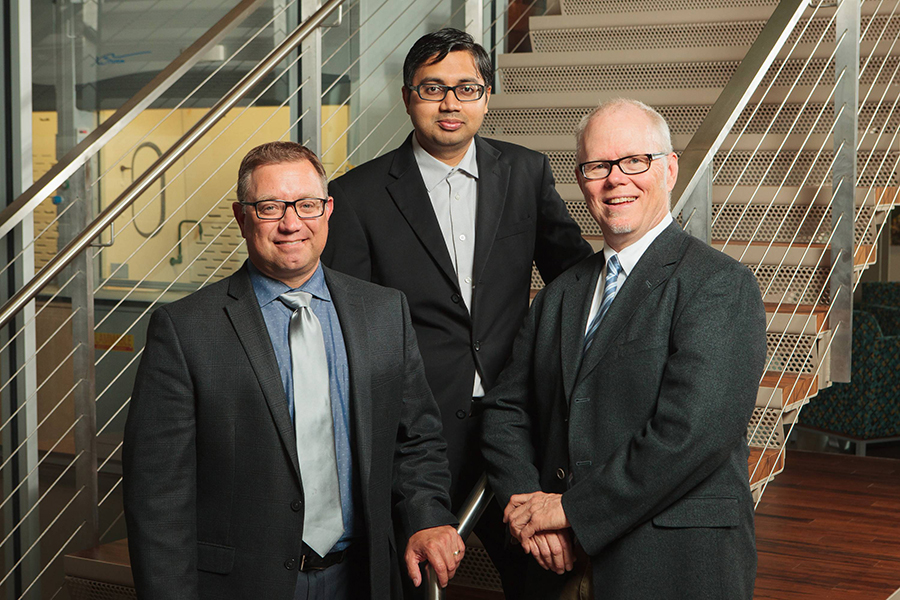New Licensing Agreement Makes it Easier for Inventors to Form Companies
By: Sally Logue Post
More Innovation at Texas Tech

English Professor's Invention Featured in Super Bowl Startup Competition
A new type of licensing agreement developed by the Texas Tech Office of Research Commercialization (ORC) is making it easier to spin lab discoveries into startup companies.
As with most universities, Texas Tech owns any intellectual property created by faculty or staff utilizing university resources. That can make it difficult for an inventor to create a business plan and conduct customer discovery that is necessary to determine whether to form a startup company and license the technology themselves or simply allow ORC to license the product to someone else.
New Way of Doing Business
The new Validation License is intended for university entrepreneurs who wish to participate in a federally funded proof of concept program, such as the National Science Foundation's I-Corp program or the federal SBIR/STTR programs. I-Corp teams are typically made up of a team lead, who is usually a graduate student, an inventor, and an entrepreneur.
The license offers entrepreneurs a no-cost, six month validation license, with an option to convert it into an exclusive license agreement for the patent rights at the end of the term. After six months, if the entrepreneur has formed a company and submitted a business plan, the company can pay a $1,000 conversion fee and negotiate fair and reasonable license terms for an exclusive license agreement. During the term of the validation license, the ORC is responsible for all patent prosecution expenses.
The license was developed after David Snow, ORC senior managing director, served as a mentor for an I-Corp team. The experience made him realize how difficult it is for inventors to answer questions about who controls the technology during the customer discovery process.
“We believe that the new Validation License makes the commercialization process easier for teams that want to lock down access to the patent rights while they validate the technology and complete their proof of concept work,” said Snow. “The Validation License gives I-Corps teams the legal control they need over the patent rights, while they invest their time and money to make a go or no-go decision about commercializing the technology. We hope this new program encourages more Texas Tech teams to participate in the I-Corps program.”
How it Works

Suhas Pol, a Texas Tech research professor in the Department of Mechanical Engineering, and his partners; Kerry Gilbert, professor of physical therapy at TTUHSC and co-founder; and Phil Sizer, University Distinguished Professor and associate dean for research at TTUHSC, took advantage of the Validation License as they went through the I-Corp program.
“With the Validation License, we can now have an agreement with the university that gives us the ability to perform customer discovery and tell potential customers that we have secured the right to license the product,” he said. “We had the assurance that the university would not negotiate a contract with another party during the execution period of the license – that we would have the opportunity to negotiate a full license.”
Pol and partners representing both Texas Tech and the Texas Tech University Health Sciences Center, have developed a precision diagnostic technology that allows physicians to determine if muscles or nerves are performing as they should in vivo, validate their treatments, and also possibly prevent injury, making sports medicine a target market. Another market being explored is obstetrics and gynecology. Pol says the technology could be used to help a physician measure scar tissue after a caesarean section allowing them to more accurately determine the risk associated with future natural childbirths. This market, he said, is still being studied.
“If something is broken, you can see that on an MRI,” Pol said. “If the injury is to a muscle or nerve, it can't be visualized. Our technology objectifies the mechanical performance of the tissue to determine if it's damaged. The physician can better determine what treatment is needed, or if treatment is underway, how it is working.”
For ORC, allowing inventors to go through commercialization programs and do customer discovery helps to better define the actual market for the technology.
“Once an inventor goes through a commercialization program, such as I-Corp, they may find that the market for their technology is not at all close to what they had envisioned,” Snow said. “With that knowledge we are able to file a more accurate patent. If the inventor's team decides not to pursue a full license, the information they have gathered help ORC pursue licensing to other companies in a more targeted fashion.”
Snow also points out that it typically takes an average of 40 months from the time a technology is disclosed to the university until a license can be executed. With the Validation License, his office can cut that timeline to 30 months.
“There are major patent filing decisions that have to be made well in advance of that 40 months,” he said. “The idea with Validation License is that teams can engage with all the entrepreneurial programs to de-risk the technology. Some of the most important decisions made on intellectual property must be made at 12 months and 30 months.
Success Story
The team was successful in the national I-Corp program receiving $50,000. They also have taken advantage of a number of entrepreneurial programs offered through Texas Tech's Innovation Hub at Research Park including the Texas Tech Accelerator program, which teaches participants how to write a business plan.
“We are a group of researchers with no training in what to do with the technology we developed,” Pol said. “We thought it had value and we could have formed a company right away, but we really wouldn't have known what to do with it. The Accelerator taught us how to write a business plan and how a startup company should be organized and what we need to do to be successful. It's a great complement to the I-Corp program.”
The team has also received the President's Innovation Award and has applied for a federal SBRI or Small Business Innovation Research grant, which is a seed program to support small businesses engaged in technology innovation research.
For more information on the Validation License, contact the Texas Tech Office of Research Commercialization at (806) 742-4105 or email at orc@ttu.edu.
Discoveries
-
Address
Texas Tech University, 2500 Broadway, Box 41075 Lubbock, TX 79409 -
Phone
806.742.3905 -
Email
vpr.communications@ttu.edu
